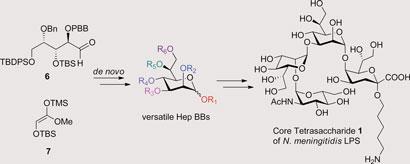Meningitis-causing bacteria produce a sugar layer that could be used against them in a vaccine
Scientists in Germany have synthesised the core part of a sugar compound produced by the pathogenic bacteria responsible for meningitis - Neisseria meningitides - which could be used in a vaccine for meningococcal diseases, in particular meningitis B.
Pathogenic bacteria produce a polysaccharide layer, forming a capsule to cloak antigenic proteins on their surface that would otherwise provoke an immune response to destroy the bacteria. Currently available vaccines are based on capsular polysaccharides and provide protection against four major forms of meningitis, but not meningitis B. This is because the capsular polysaccharide for meningitis B resembles carbohydrates present in the central nervous system, so using it in a vaccine risks triggering an immune response against them as well.
Now, Peter Seeberger from the Max Planck Institute of Colloids and Interfaces, Potsdam, and colleagues have made the inner core of the lipopolysaccharide produced by N. meningitides as a safer alternative. The resulting tetrasaccharide consists of Hep (heptose) and Kdo (octulosonic acid) building blocks.

An obstacle to the synthesis, which the team overcame, was the inertness of one of the hydroxyl groups on the Kdo building block that caused a reactivity mismatch in the coupling of Hep to Kdo. ’The tetrasaccharide synthesis began with the de novo synthesis of the heptose building blocks. The second key step consisted of a convergent and stereocontrolled [2 + 2] approach, where the challenging Hep-Kdo disaccharide was effectively constructed. This required fine tuning of the reactivities of the Hep molecules,’ explains Seeberger.
’It is a very elegant piece of work that will enable systematic studies into the use of lipopolysaccharide fragments as broad-spectrum vaccine candidates for Neisseria for the first time,’ says Gerd Wagner, a medicinal chemistry expert from King’s College London, UK.
With the threat of increasing bacterial resistance to antibiotics, using vaccines to prevent diseases like meningitis becomes even more important. ’A lipopolysaccharide-based vaccine against all known strains could provide comprehensive protection against all the disease-causing serogroups of N. meningitidis, including group B,’ says Seeberger. ’If our synthetic molecule could be developed into a commercially available vaccine, it might change many people’s lives in areas where meningitis is an epidemic.’
Jennifer Newton
References
Chem. Sci., 2012, DOI: 10.1039/<man>c1sc00804h</man>






No comments yet